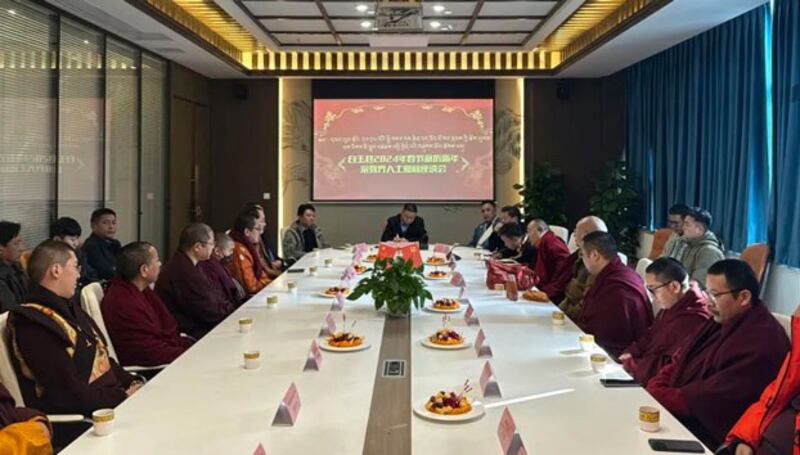Bearing gifts ahead of the Tibetan New Year, Chinese authorities in Tibetan-populated parts of Sichuan province visited at least 35 Buddhist monasteries, and urged eminent monks to “deeply expose and denounce” the Dalai Lama and to safeguard the “unity of the motherland.”
The officials, led by Secretary Liu Yan of the Palyul (in Chinese, Baiyu) County Communist Party Committee, visited the monasteries in Kardze Tibetan Autonomous Prefecture on Jan. 11- Jan. 17, according to a statement by the United Front Work Department, which oversees the Chinese government’s domestic and external influence operations.
Tibetan New Year, known as Losar, this year falls on Feb. 10, the same day as China’s Lunar New Year, the biggest holiday of the year.
Liu extended Losar greetings and emphasized the need to “consciously enhance national awareness, legal awareness, and citizen awareness” and “deeply expose and denounce the divisive nature of the Dalai Lama and the Dalai clique.”

Beijing believes that the Tibetan spiritual leader, who lives in exile in Dharamsala, India, wants to split off the Tibet Autonomous Region and other Tibetan-populated areas in China’s Sichuan and Qinghai provinces from the rest of the country.
However, the Dalai Lama does not advocate for independence but rather a “Middle Way” that accepts Tibet’s status as a part of China and urges greater cultural and religious freedoms, including strengthened language rights that are guaranteed for ethnic minorities under China’s constitution.
The officials visited well-known monasteries in the area, including the Palyul Monastery, Yarchen Gar Monastery and Katog Monastery, which are associated with the Nyingma school of Vajrayana Buddhism.
Liu also led a separate meeting in Chengdu on Jan. 22 with representatives of various religious sects, where he mandated that Tibetan Buddhist leaders ensure that the monastic groups and their followers “firmly safeguard the unity of the motherland and national unity.”
He urged them to promote the “five identifications” that President Xi Jinping has repeatedly said is required of all Chinese citizens and minority groups. They include identifying with the motherland, the Chinese nation, the Chinese culture, the Chinese Communist Party and socialism with Chinese characteristics.
‘Tools of deception’
Tibet watchers criticized the move as disingenuous and an effort to put pressure on the Tibetan monastic community in Palyul to toe the Chinese Communist Party line.
“The Chinese government’s practice of extending greetings and monetary gifts to the Tibetan monks and nuns on important occasions and holidays are actually tools of deception,” said Dawa Tsering, director of the Tibet Policy Institute, the official think tank of the Central Tibetan Administration in Dharamsala.
“They are not any kind of sincere greetings as the Chinese authorities like to make them out to be,” he told Radio Free Asia. “The government usually doles out these gifts to Tibetans and use these to pressure the people to denounce the Dalai Lama and pledge their allegiance to the party.”

Pema Gyal, a researcher at the London-based Tibet Watch, told RFA that the Chinese government uses these visits on important occasions and celebrations “as a pretext to spread their propaganda to the general public and create awareness about their repressive policies.”
In their New Year message to Tibetan Buddhist leaders in Palyul county, Chinese authorities also ordered head monks to carry out an “in-depth, systematic study and political education” of the “party’s religious work theories and principles and policies.”
This includes raising awareness about the importance of adhering to Xi’s directive for the Sinicization of Tibetan Buddhism, which mandates the adoption of socialist values into the interpretation of religious doctrines, teachings and practices, Liu said.
Under the Communist Party's Administrative Measures for Religious Clergy regulation, adopted by the State Administration of Religious Affairs in January 2021, religious clergy members must support Xi's plans for the "Sinicization of religion" or "adaptation of religions to China's socialist society" and work in accordance with the country's national interest and ideology.
Translated by Tenzin Pema for RFA Tibetan. Edited by Roseanne Gerin and Malcolm Foster.
